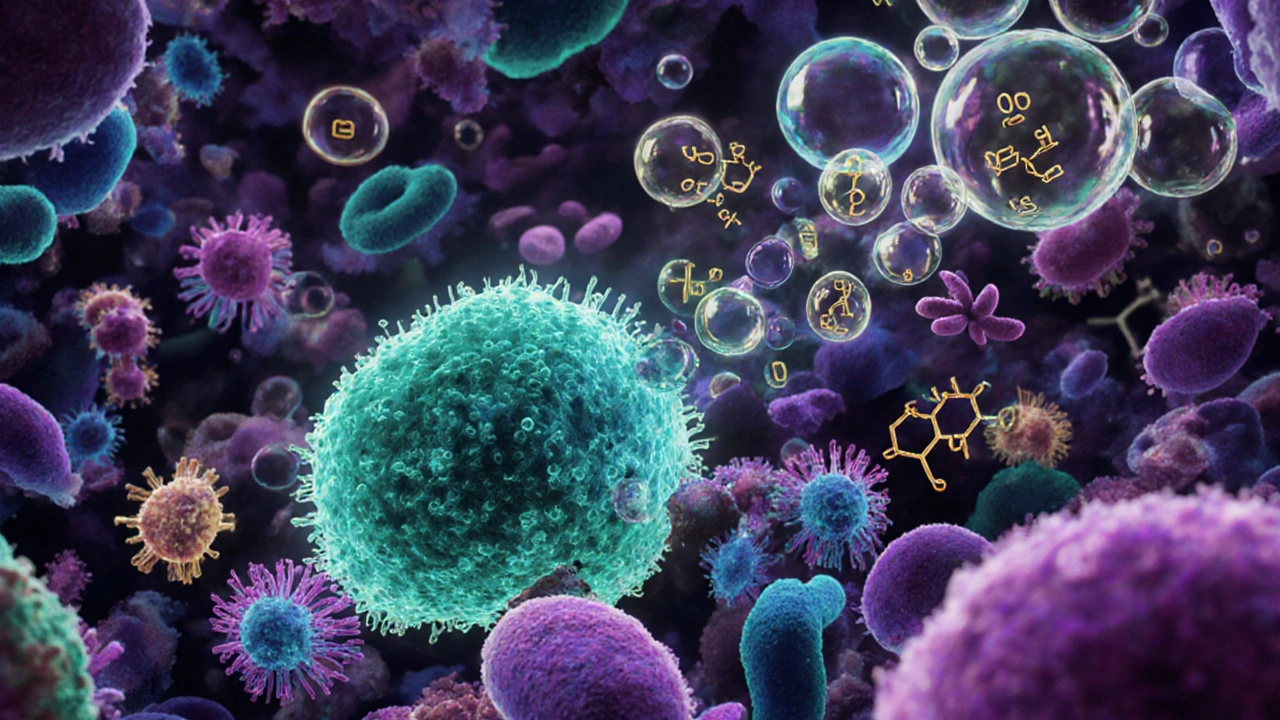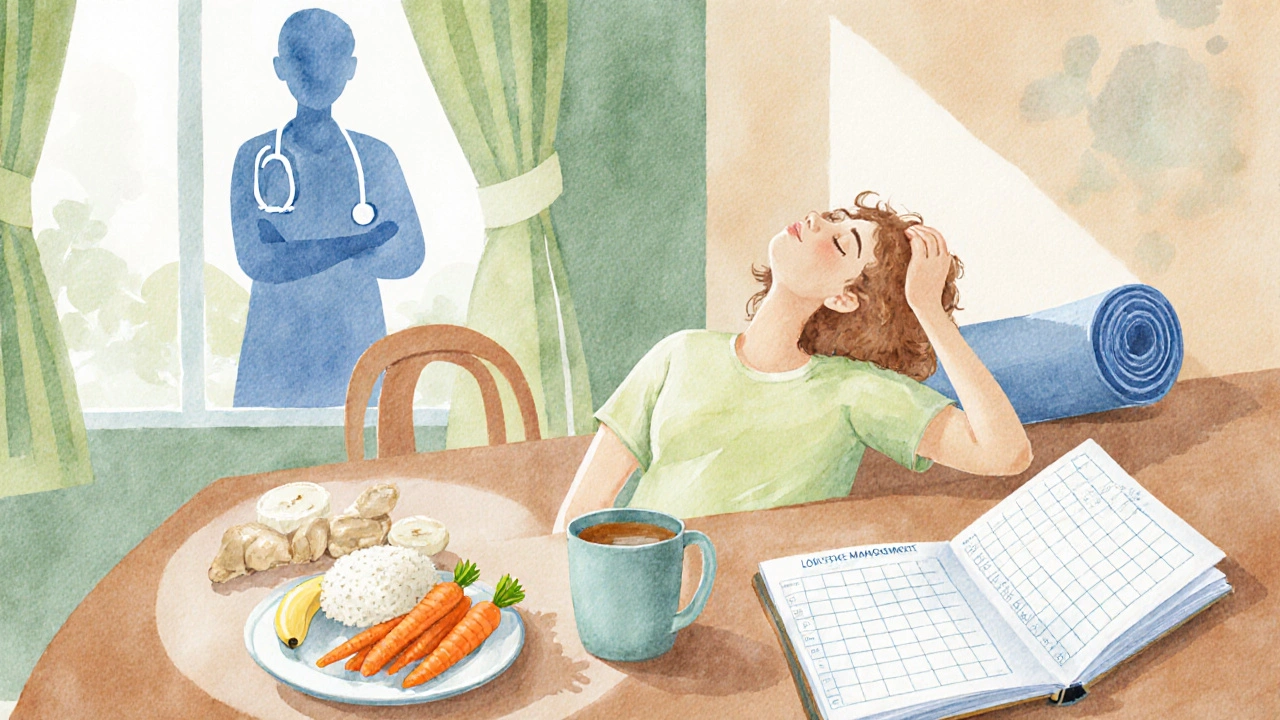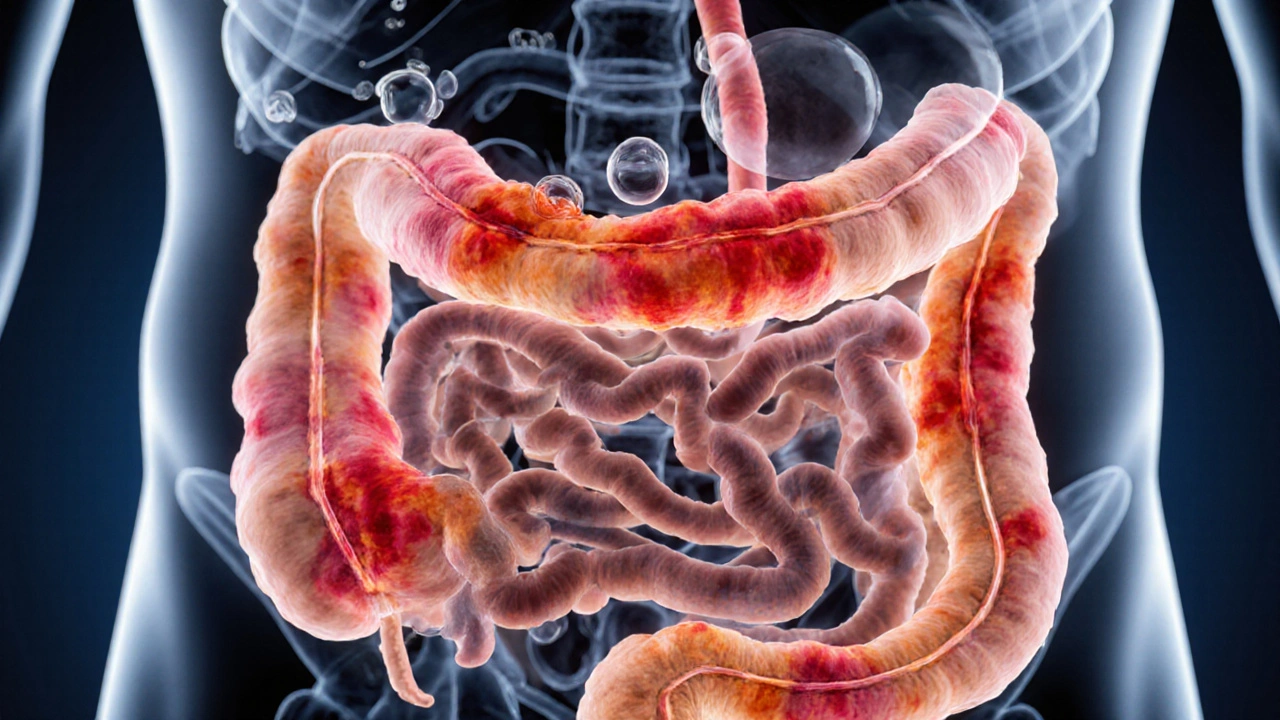IBD Symptom Checker
Increased Flatulence
Sudden or persistent increase in gas production
Abdominal Pain
Pain that improves after passing gas
Bowel Changes
Loose stools, blood, or mucus
Other Symptoms
Weight loss, fever, fatigue
Symptom Analysis Results
When it comes to gut trouble, Inflammatory Bowel Disease (IBD) is a chronic condition that inflames the digestive tract, leading to pain, diarrhea, and fatigue. It mainly includes Crohn's disease and ulcerative colitis. While most people think of diarrhea and bleeding, another symptom that pops up often-flatulence-gets less attention. This article unpacks why gas can be a clue, not just a nuisance.
What is flatulence and why does it happen?
Flatulence is the release of gas from the intestines through the rectum. The gas comes from three sources: swallowed air, the breakdown of undigested food by bacteria, and chemical reactions in the gut. Certain foods-beans, onions, carbonated drinks-contain fermentable fibers that feed gut microbes, producing hydrogen, methane, and carbon dioxide. That’s why you might hear squeaky noises after a big bean salad.
Getting to know IBD: Crohn's vs. ulcerative colitis
Both forms of IBD involve an overactive immune response, but they target different sections. Crohn's disease can affect any part of the GI tract, from mouth to anus, often in patches. ulcerative colitis is limited to the colon and rectum, with a continuous line of inflammation. The patterns matter because they shape symptoms-including how much gas you feel.
How flatulence fits into the IBD picture
Research published in the Journal of Gastroenterology (2023) shows that people with active IBD produce more short-chain fatty acids (SCFAs) from fiber fermentation, leading to higher gas volume. The inflamed lining also slows transit, giving bacteria more time to break down food. In short, inflammation ↔ slower movement ↔ more bacterial fermentation ↔ more flatulence. So, a sudden increase in gas could signal a flare.
The gut microbiome’s role
The gut microbiome is a bustling community of bacteria, fungi, and viruses. In IBD, diversity drops and harmful strains rise. These imbalances boost gas‑producing microbes like Methanobrevibacter smithii. When the microbiome is out of whack, you notice bloating and noisy exits. Probiotic supplements or fermented foods can help restore balance, but they should be chosen carefully under medical guidance.

Recognising when gas is a warning sign
- Sudden, persistent increase in flatulence over weeks.
- Accompanying abdominal pain that improves after passing gas.
- Changes in stool consistency (loose, blood‑streaked, or mucus‑filled).
- Unexplained weight loss or fever.
If you tick two or more of these boxes, it’s time to talk to a gastroenterologist. Normal diet‑related gas rarely comes with blood or severe pain.
How doctors diagnose IBD when gas is a symptom
- Medical history and physical exam.
- Stool tests to rule out infections.
- Blood work for inflammatory markers (CRP, ESR).
- Colonoscopy with biopsies - the gold standard for visualising ulcers and taking tissue samples.
- Imaging (CT or MRI) if small‑bowel involvement is suspected.
The endoscopy report will tell whether you have Crohn's or ulcerative colitis and how severe the inflammation is.
Diet tweaks that tame both IBD and gas
One of the most practical ways to lower gas while keeping IBD in check is the low‑FODMAP diet. FODMAPs (Fermentable Oligo‑, Di‑, Mono‑Saccharides And Polyols) are short‑chain carbs that feed gas‑producing bacteria. A typical 2‑week elimination phase removes onions, garlic, wheat, certain fruits, and lactose. Afterward, you re‑introduce foods one at a time to see what triggers you.
Other lifestyle tips
- Eat slowly and chew well-less swallowed air.
- Avoid carbonated drinks and chewing gum.
- Stay hydrated; water helps move waste through the colon.
- Gentle exercise (walking, yoga) promotes regular bowel movements.
Stress management matters too. Stress can flare IBD and increase gut motility, which may amplify gas.

Medications that may affect flatulence
Some IBD drugs, like corticosteroids, can temporarily increase appetite and cause constipation, both of which affect gas. Antibiotics used for bacterial overgrowth can also shift the microbiome, leading to excess methane. If a new medication makes you gassy, discuss dosage adjustments or probiotic add‑ons with your doctor.
When to seek urgent care
If flatulence comes with severe abdominal pain, vomiting, high fever, or sudden blood loss, treat it as an emergency. These signs may point to a perforation, toxic megacolon, or severe infection-conditions that need immediate hospital care.
Comparing IBD and IBS: why the distinction matters
| Aspect | IBD | IBS |
|---|---|---|
| Inflammation | Visible on endoscopy; tissue damage | None; functional disturbance only |
| Risk of cancer | Higher, especially with long‑standing ulcerative colitis | Not applicable |
| Blood in stool | Common during flares | Rare |
| Gas and bloating | Often present, linked to inflammation | Frequent, but no tissue damage |
| Treatment focus | Immunosuppressants, biologics, surgery | Diet, stress management, antispasmodics |
Bottom‑line takeaways
Flatulence isn’t just a funny side effect-it can be a quiet alarm that your gut is inflamed. By watching gas patterns, pairing them with other red‑flag symptoms, and getting proper testing, you can catch IBD early and start treatment before complications arise. Simple diet swaps, stress control, and talking openly with your doctor are the best tools to keep both gas and IBD under control.
Frequently Asked Questions
Can a high‑fiber diet worsen IBD‑related gas?
During a flare, soluble fiber can ferment more, increasing gas. A low‑FODMAP or tailored fiber plan is usually safer until inflammation settles.
Are probiotics effective for reducing flatulence in IBD?
Certain strains like VSL#3 have shown promise in clinical trials for maintaining remission and lowering gas. However, results vary, so pick a probiotic under medical advice.
How quickly can a low‑FODMAP diet reduce gas?
Many patients notice less bloating and fewer episodes within 1‑2 weeks of strict elimination, especially when combined with anti‑inflammatory meds.
Is flatulence ever a sign of colon cancer in IBD patients?
Persistent new‑onset gas accompanied by weight loss, blood, or a change in bowel habits warrants a colonoscopy to rule out dysplasia or cancer.
Should I stop my IBD medication if gas becomes unbearable?
Never stop a prescription on your own. Talk to your gastroenterologist-they may adjust dosages or add a gas‑relief strategy.


Comments
Katheryn Cochrane
The gut microbiome data you cited is solid, but the article glosses over the heterogeneity of IBD phenotypes. Not all patients will exhibit increased SCFA production; some subtypes actually have reduced fermentation capacity. Moreover, the low‑FODMAP recommendation should be qualified with a note on nutritional adequacy, which is missing here. A more nuanced risk‑benefit analysis would prevent readers from oversimplifying diet adjustments. In short, the piece is informative but leans too heavily on a one‑size‑fits‑all narrative.
October 7, 2025 AT 13:19
Michael Coakley
Ok, so u think beans are the real villain here? lol.
October 7, 2025 AT 14:10
ADETUNJI ADEPOJU
From a pathophysiological standpoint, the inflammatory cascade in Crohn's disease precipitates dysbiosis via cytokine‑mediated epithelial barrier disruption, which in turn amplifies microbial gasogenesis. While the author mentions Methanobrevibacter smithii, they neglect the role of opportunistic proteobacteria that produce excess hydrogen sulfide, a toxin magnifying mucosal injury. Ethically, we must caution patients against self‑prescribing probiotics without a stratified microbial profile, lest we exacerbate the very dysbiosis we aim to correct.
October 7, 2025 AT 15:00
Janae Johnson
It is intriguing that the article emphasizes flatulence as a diagnostic beacon, yet I would argue that this focus detracts from the more critical indicator of mucosal ulceration. While the tone remains courteous, the underlying premise seems to downplay the necessity of endoscopic verification. In clinical practice, a fleeting increase in gas seldom supersedes histological evidence. Thus, the narrative, albeit well‑written, may inadvertently mislead lay readers into overvaluing a symptom that is, frankly, insufficiently specific.
October 7, 2025 AT 16:06
Kayla Charles
Hey folks, let me break down why this information matters for anyone navigating IBD and the ever‑annoying gas issue. First, recognizing that a sudden surge in flatulence can be a subtle flare sign empowers you to act before pain escalates. Second, pairing this symptom with other red flags-like weight loss or blood in stool-creates a more reliable alarm system than watching any single cue in isolation. Third, the low‑FODMAP approach isn’t just a fad; it’s a structured elimination that targets those fermentable carbs that feed gas‑producing bacteria, and many patients report noticeable relief within a couple of weeks. Fourth, don’t forget the role of mindful eating: chewing thoroughly, avoiding carbonated beverages, and steering clear of gum can reduce swallowed air, which is a hidden contributor to bloating. Fifth, regular, gentle exercise such as walking or yoga can stimulate motility, helping move gas through the colon more efficiently. Sixth, stress management is crucial-high cortisol levels can aggravate inflammation, which in turn can exacerbate fermentation and gas production. Seventh, if you’re on medications like steroids or antibiotics, keep an eye on how they affect your gut flora; sometimes a probiotic supplement, chosen under professional guidance, can restore balance. Eighth, always communicate changes in gas patterns to your gastroenterologist, especially if they coincide with pain that eases after passing gas-that pattern often signals active inflammation. Ninth, the article correctly flags emergencies: severe pain, fever, vomiting, or sudden blood loss demand immediate attention. Tenth, remember that IBD and IBS, while sharing some symptoms like bloating, require different treatment pathways, so accurate diagnosis matters. Eleventh, for those in remission, maintaining a balanced diet rich in low‑FODMAP fruits, tolerated vegetables, and lean proteins can keep both inflammation and gas at bay. Twelfth, hydration isn’t just a buzzword; adequate water intake lubricates the bowel and reduces the time food spends fermenting. Thirteenth, keep a simple symptom diary-note the foods you eat, the amount of gas, abdominal sensations, and any accompanying signs. Fourteenth, share this diary with your healthcare team; it provides objective data that can guide medication tweaks. Fifteenth, stay hopeful: as research advances, we’re seeing more targeted therapies that not only control inflammation but also modulate the microbiome, potentially reducing gas as a side effect. In essence, flatulence isn’t just a comedic footnote; it’s a valuable clue in the broader IBD puzzle. Stay proactive, stay educated, and don’t let gas get the best of you.
October 7, 2025 AT 17:13
Paul Hill II
I appreciate the thorough overview and think it’s a solid resource for patients. Adding a simple tip: try a food journal alongside the low‑FODMAP trial to pinpoint personal triggers. Small changes, like swapping carbonated drinks for herbal tea, can make a noticeable difference without overhauling your entire diet.
October 7, 2025 AT 18:36
Stephanie Colony
As an American who values cutting‑edge science, I find it refreshing when articles finally acknowledge that diet isn’t just a personal choice but a national health priority. The low‑FODMAP protocol reflects our country’s innovative spirit, yet many still cling to outdated myths about “just eating more fiber.” Let’s be clear: sophistication in nutritional strategy distinguishes a progressive nation from one stuck in the past.
October 7, 2025 AT 20:00
Abigail Lynch
Everyone talks about gut bacteria like it’s the latest trend, but what they don’t mention is the hidden agenda behind big pharma’s “probiotic” push. They want us to believe a simple supplement will fix everything while they keep us dependent on expensive meds. Meanwhile, the real culprits-industrial food additives and GMO crops-are never discussed. Keep your eyes open; the gas you feel might be a symptom of something far larger than just IBD.
October 7, 2025 AT 21:40
David McClone
So, the article tells us flatulence can be a flare cue-how original. I guess next they’ll say sneezing predicts heart attacks. Still, it’s mildly useful if you’re already tracking every crumb you eat.
October 7, 2025 AT 23:20
Jessica Romero
Thank you for laying out the clinical pathway in clear, jargon‑rich language. It’s important to emphasize that while stool tests and imaging are essential, they should be complemented by a thorough dietary assessment. Patients often underestimate the impact of hidden fermentable substrates, such as polyols in sugar‑free gums, which can exacerbate gas production. By integrating a structured elimination diet with periodic re‑challenge phases, clinicians can tailor interventions that respect both the biochemical and psychosocial dimensions of IBD management.
October 8, 2025 AT 01:16
Michele Radford
The piece does a decent job of summarizing current knowledge, yet it falls short by not critically addressing the heterogeneity of study populations in the cited research. Without stratifying patients by disease activity indices, the correlation between SCFA levels and flatulence remains tenuous. Moreover, the recommendation to “monitor symptoms” lacks actionable thresholds, leaving readers without concrete guidance.
October 8, 2025 AT 03:13
Mangal DUTT Sharma
Hey everyone! 😊 I really enjoyed this deep dive into how gas can signal an IBD flare. It’s amazing how our bodies give us subtle hints, isn’t it? 🌟 A couple of things that helped me: keeping a daily log of meals and symptoms, and using probiotics that are specifically formulated for IBD-always after checking with my doctor. Also, staying active with gentle walks really helps move things along. Remember, it’s okay to feel overwhelmed, but you’re not alone in this journey. If you ever need someone to vent to, I’m here! 💙
October 8, 2025 AT 05:10
Gracee Taylor
I think it’s great that we’re discussing flatulence as more than a joke. Let’s keep the conversation respectful and supportive, acknowledging that each person’s experience with IBD is unique. Sharing practical tips, like mindful eating and the low‑FODMAP approach, can empower others without judgment.
October 8, 2025 AT 07:06